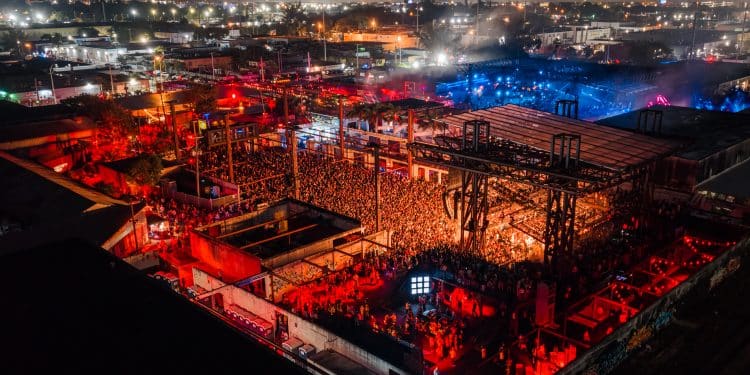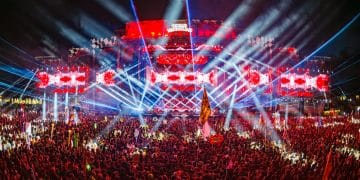ATTLAS teamed up with Richard Walters to birth a new project into the world, Sun Lo, and swung by to give insight into its creation and more.
Canada has produced a number of remarkable artists in the electronic music scene over the years, and one of the most beloved is ATTLAS. First appearing on mau5trap in 2015, he continued to grace the imprint for years while gaining praise from tastemakers and fellow artists alike with his impeccable productions that tugged at heartstrings.
While releases like the Bloom and Charcoal Halo EPs gave listeners plenty of soundscapes to bask in, it wasn’t until 2020 that ATTLAS embarked on one of his biggest runs of releases in his career. That year, he kicked everything off by delivering his debut album Lavender God before landing Faya / The Crack on This Never Happened. Then, in the latter half of 2020, he surprised everyone with Out Here With You, his second album that showcased just how immersive his soundscapes can be.
The following year was fairly quiet, with ATTLAS delivering tunes like “Feels Like,” the piano-driven “86cc,” and “Into Arms of Lovers” with MAYLYN. Each of these tracks showed off a different side of the Canadian artist, all of which built up into 2022’s Carry It with You, his third album to land on mau5trap. This album was yet another emotion-laden piece from ATTLAS that tied his organic influences and personal experiences together to create a truly beautiful body of work.
Now, with three full-length albums under his belt, ATTLAS is looking to even brighter futures ahead. Part of this new journey was seen with the release of his collaborative track with Mango, “Over The Water,” on Monstercat, but that wasn’t all that he had in store for fans. This month saw another refreshing chapter surface from the mind of ATTLAS, a new project with Richard Walters dubbed Sun Lo. The two spent time working together during the pandemic, and the first taste of those sessions has arrived in the form of “Factory Gates,” the lead single off their forthcoming album on Nettwerk.
After years of watching this electronic music maestro craft up soundscapes that touched hearts, it was an absolute pleasure to get the chance to catch up with ATTLAS to dive deep into the project and plenty more. Listen to “Factory Gates” on your preferred platform and read on for the full conversation with him.
Watch the official video for “Factory Gates” on YouTube:
Hi, Jeff. Thanks so much for chatting with me today. It’s been a pleasure to see you develop your sound over the years and grow as an artist. I’ve often asked artists how they feel their evolution has been, so how have you defined your growth since your early days on mau5trap in 2015?
For me, these kinds of conversations are the pit stops along the highway, where I get a chance to say, oh, yeah, was there growth? There are a lot of times when I feel I’m going to be running out of good ideas, and yet, I’m still coming up. In many ways, it’s not super different, and in many ways, it is. The first time I had a track with a million streams was “Luna,” which you could fit on any of my current releases. And there are tracks like “I Need You More,” which was awesome, but I wouldn’t put that out now – at least the production, the sample is still just as cool as ever.
Production-wise, I’ve learned new things, and I’ve tried to employ them with reasonable efficacy, but you’re constantly learning. Something like writing in a new environment or when you’re single versus in a relationship changes your writing. Or it may change when you write.
I think the reasons for writing those first EPs and projects, both personally and creatively, and the why of it, about being a little more aspirational, trying to get one record signed versus putting out albums and trying to be creatively consistent enough without retreading old ground. So evolution is a work in progress. As much as the music is a reflection of the individual, I have a lot to learn musically so far. But if I could sum it up quickly, I was learning a lot from those I respected and how they did it. And then, I got to a point where I felt comfortable using those same tools and techniques to tell my story, not just to retread that old ground.
I always say it’s hard enough to find your voice, but what will you do when you have that voice? If you’ve got a guitar, are you singing the blues, or are you singing gospel? Are you singing a love song or a breakup song? What I’ve done with the tools, as I’ve developed them, has been indicative of a person learning about himself as much as the music.
I was going to mention the fact that when you go back, and you listen to “Luna,” “Beginning,” “Taylor,” or “Riot,” those songs sound very similar to what you’re making today and what has become the signature ATTLAS sound. It’s cool to see the roots of that all those years ago and come through in your recent work.
Oh, definitely, and there’s a chance to be yourself, right? Sometimes, certain sounds have a lot of competition, and they get crowded. I’m okay being in a less crowded place but a little bit more myself. And yeah, when you’re trying to draw a line between past productions and current ones, it’s pretty obvious to say the person that made “Riot” was also the same producer that did “Faya.” However, one seems like a step forward in confidence or even just how you craft the mix. Those are more audio details than songwriting details, but the songwriting is just as important as anything technical happening, at least in this genre.
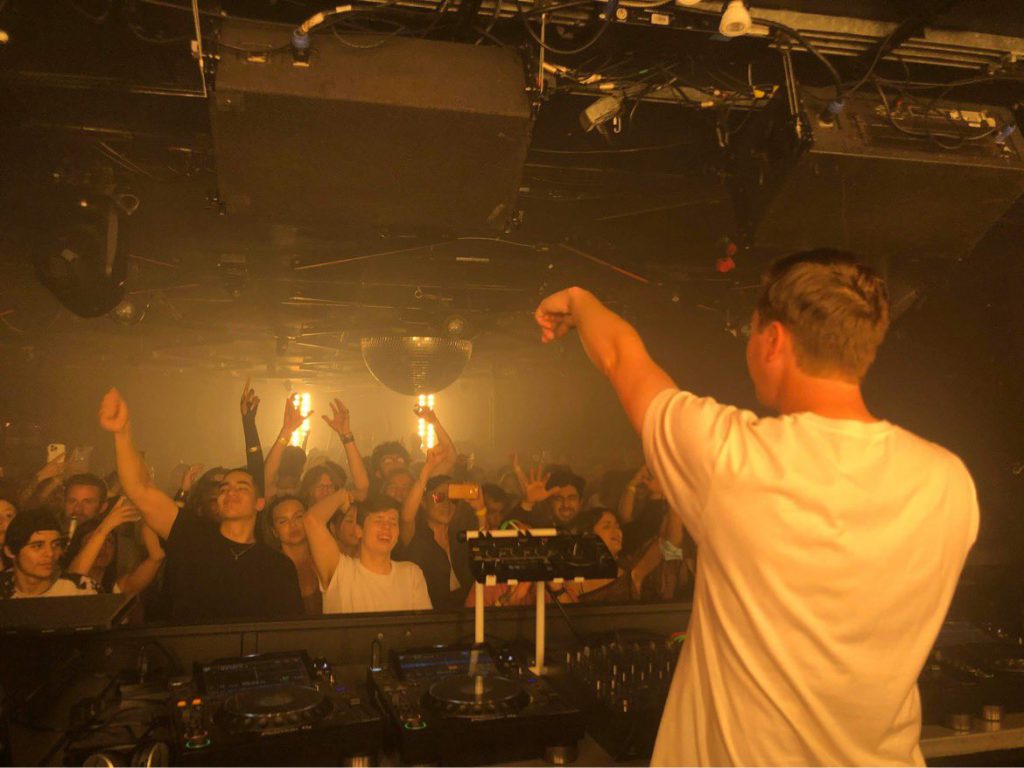
You brought up a good point with “Faya.” That was on This Never Happened, and you’ve also recently released a Monstercat. Has growing out of mau5trap allowed you to be more creative and express yourself differently?
Initially, I thought it was going to be that for sure. But then I realized wherever I go, or wherever you go, you’re still there, and I’m still me. It may be more about finding a place where the music felt more at home. Context matters a lot with music in the way things are crafted. So for the things that motivate me creatively, it’d be a shame not to explore all the other places that might fit. And then there’s the obvious reality of contracts, what you signed and who owns it, where it belongs, what you’re allowed to do, and all that. So by nature of that, there’s a little that’s out of my hands.
I know we’re going to get to this whole project with Richard, but that’s my fourth album delivered since 2020. And many times for album number one, you’ve got this many demos to polish up, maybe there are 15 or 16 that could fit on that project, but then do they go together? By the time I finished delivering my fourth album since 2020, plus singles, remixes, and EPs, it’s a lot of music.
It can be nice when you have a deadline because that filters away large swaths of the unknown during the writing process. But right now, I have a blank canvas in front of me.
That’s an interesting thing because when you’re under contract, you have to meet deadlines, but when you’re free, you have to set your own. So how do you manage your time now without the constraint of a label pressing down on you?
Well, it’s pretty recent because we just delivered the album to Nettwerk, who’s releasing the one Richard and I did as Sun Lo. A few things were lower down on the list of priorities; projects, tracks, and ideas that I wanted to finish. I’m going through those now and realizing, “that didn’t fit on the album because I just didn’t finish it in time,” or “this is a great idea that maybe deserves to be fleshed out.” There’s a lot of that, but you have to set aside creative time because a melody might not work in one song but in another.
I also live where we moved to during the pandemic, and I don’t know anybody else here. So I play with our cat, do chores, work, or be stressed about work. It’s easy to get mad at yourself, but I have healthy habits that kick my butt back into productivity when I slip. But right now, the inbox is stuffed with the Sun Lo project; it’s an amazing amount of support. I have yet to have that kind of support for a project in my life.
Well, let’s talk about Sun Lo. Where did the roots of this project develop? I know that Richard Walters lives in England, right? So how did this all come to be?
This goes back to the pandemic when he came across my music through the grapevine. He’s worked with his solo band, and he’s done songwriting and top lining in electronic music. The dominant overlap would have been This Never Happened, Armada, that kind of group. Through that, he found my music and reached out to me when we were both waiting to find out what was going to happen next in the world.
There was no project to get over to a label; it was more conversational-based. Richard reached out, and we were just talking about music in general, sharing ideas that we were into. I had written an ambient album two or three months before he reached out to me. We started tossing around ideas like ambient music and meditation, which kept my head screwed on semi-straight during those dark, lonely months. He started singing to it, which was beautiful. It was pastoral, but it was intimate. It was grand, but it was humble. It was a beatless ambient track that worked well; from there, we thought it would be a shame to stop writing now.
We weren’t writing with any expectations. There was no goal, and we had no pitch in mind. We were almost just writing as an act of survival. It was the only thing that you knew you could probably still do, but could you do it without the carrot being dangled in front of you that used to get you from point A to B to C? We just ended up writing more and more together. We kept going just for ourselves, and then real interest started generating.
Yeah, definitely. And the lead single, “Factory Gates,” is such a beautiful track. I’d like to know your production process with the distance between the two of you.
It was a lot of back and forth. We swapped things out constantly, but it was never face-to-face; I still haven’t met him.
There were a lot of phone calls where we’d talk about life more than we’d talk about the details of the music. I found that kind of gave us a much better sense of where to go because when someone says, “oh, it needs more energy here,” that can mean many different things and musical contexts. It was very much getting to know the person and the music. When you find the middle of that Venn diagram as humans, that’s where the music starts to make a lot more sense. A lot of vulnerability and tenderness, but aiming towards a great project at the end.
You can hear the synergy between the two of you on the track. It felt cohesive and well put together, so I’m excited about the album and seeing where you could take this project.
Because it is a full album, there will be a slow crescendo, as we hope. You start with a great track, but by the time the album comes, we don’t want to say we used up all the good bullets in the gun. So I’m excited about it. I’m happy it’s all wrapped, mastered, and delivered. When you are time zones apart, it’s not always the quickest project. It went from an idea to a polished, finished album with art on board and more professionalism than I’ve worked with in a long time.
Yeah, this wasn’t a quick process by any means. You’ve been coming at it for two years now.
Yeah, and look at all the stuff we put out as well. That was always the funny thing; it was written alongside all our other projects, but it’s its own flavor. I was working so much by myself on so much music, cranking those three mau5trap albums out everything beyond that, plus this that I was really worried I was losing objectivity in the music. I had to get back to that recently – if I’m enjoying listening to it, that should be enough.
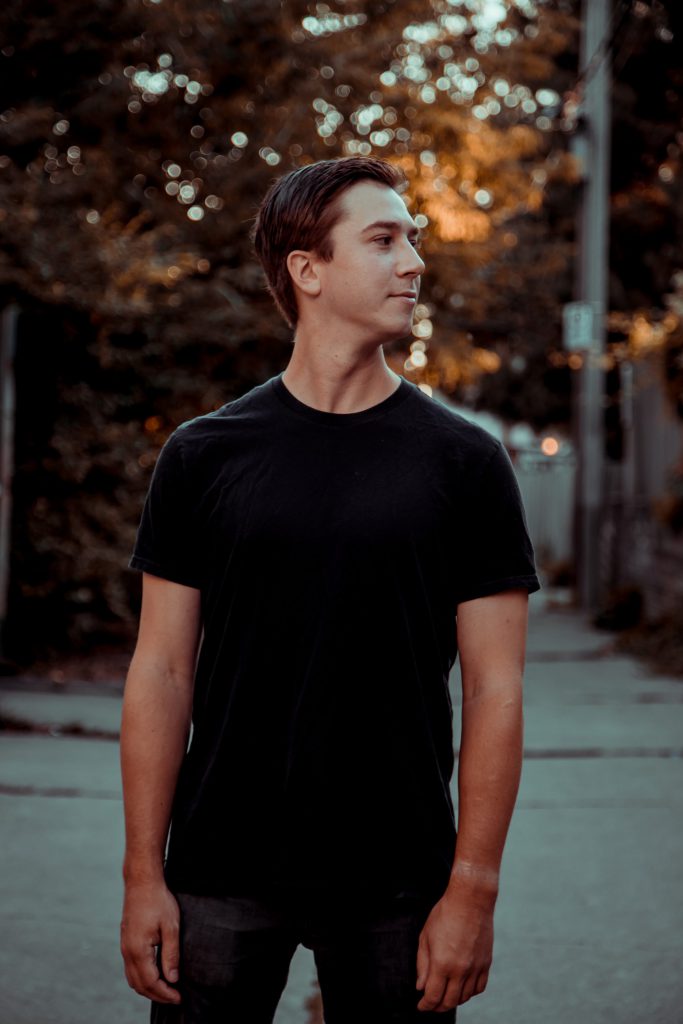
When artists like you come into their own, it’s this maturation of sound that is great to see. A lot of people get lost in the chase, so to speak, of trying to figure out what is popular instead of making something popular.
Yeah. Or if not popular, at least something you’re proud of, right? It’s hard because, by the time you’ve finished working on something, you really want a break from it, and by all measures, you probably need a break from it. You can get lost in it.
I’ve worked hard on all my projects, and I usually skip the internet for a couple of weeks after they come out – it’s terrifying. So I’m hoping this one works out because there are more vocal tracks on here than I’ve probably produced in the last five years combined. I only had the budget to do vocals on Lavender God, and even then, I basically didn’t. That’s why there are no vocals on Out Here With You and Carry It With You.
Vocals can make a track special, but Out Here With You spoke to the moment we were all living in. It was a very intimate album and refreshing to hear.
Oh, thanks. It’s interesting to put out an album when you don’t have to worry about it being played out. You could only listen to music at home, in your car, or with your headphones, but live music wasn’t a thing. So compositionally, there was a lot less pressure. There was that period where you had the freedom that your music would be appreciated or at least given a chance in a different context than it had been years prior.
Yeah, you leaned into it by doing the Out Here Together visual mix, which made it more memorable and added a different dimension. Do you have plans to do some visual-related stuff with Sun Lo as well?
Like most things, it can be budget and time specific, but this track is coming out with a video. The label we’re doing it with, Nettwerk, they’re extremely professional. They’re one of the best. If you look up their background and story, it’s no surprise. But yeah, I always leave it in the hands of the visual artists because that’s their world. Of course, we will come together and be excited about each other’s work. We’re excited because we believe the music is illustrating the picture, and the picture is illustrating the music. There’s a natural alchemy that was born out of that relationship.
You touched on it earlier, but you’re isolated. You’re not in LA, New York, or one of the big cities in the US. You’re outside of Toronto. Are you more balanced now, living outside major cities with tons of distractions?
I have the tools to be balanced. Things like the Ultra [Marathons] are really good for you. It’s the thing I’m the proudest of because, with everything else, I’ve had help. Someone had to say yes to your song, say yes to that booking, or your friends help you out when you’re in a jam. You didn’t get through your hard times because of you; all these little things help you along the way. But distance running is just putting one foot in front of the other for a long time. You don’t have music or all these things. It’s just you and your thoughts, and you have a lot of time to work stuff out.
Sometimes the pendulum will swing too hard one way versus the other. I’d like to see my friends and family a little more than I do now. I wouldn’t want to have every single weekend at the club or a festival because the writing I tend to appreciate in music reflects the experience. During the pandemic, I was worried that if I spent all my time in the basement, my music would sound like a guy alone in the basement. If you spend all your time at techno shows, your music will sound like you spend a lot of time on techno shows. So I spent a lot of time fishing and being outdoors. And the album sounded like a guy that spent a lot of time doing that stuff. Right?
Yeah. That’s true.
Even Carry It With You… that was the darkest mental place I’ve ever been in my life. I carry all the good stuff, all the bad stuff, with me. I have to carry it and process it, so getting that album done was heavy for many reasons. I’d wander around the house just staring at things, but at the end of the day, no one would write it for me; I had to write it. I had to write what I was thinking or feeling at the time. That’s why you have tracks that are just a dark beat through static and fuzz, and then the next track is reminiscing on youth. But yeah, so balance… This gives me different experiences to write about because the people who don’t go fishing are playing mainstage at Tomorrowland.
[Laughs] It’d be interesting to see David Guetta or Afrojack go fishing and see what that does to their music.
Like John Hopkins, the album he put out this year was just so beautiful, Music For Psychedelic Therapy. And the album sounded like a psychedelic experience in Ecuador, which is exactly what the album was. It takes a level of stature, respect, and integrity like his to pull off a project like that. But I like that kind of writing, that kind of album project. That works for me, but there are so many paths.
You talk to some people who write such different kinds of music, ones who are great songwriters but maybe could be better technically. Then there’s the bass scene which is almost like science fiction – the sound technology has come so far. Yet bass sets are shorter because they’re more fatiguing to listen to. Then you got Guy J, who’s going to play six tracks in an hour because they’re all 10-minute-long woven scripts almost. Those are all probably born from unique experiences and shows they did or didn’t go to at formative times in their year.
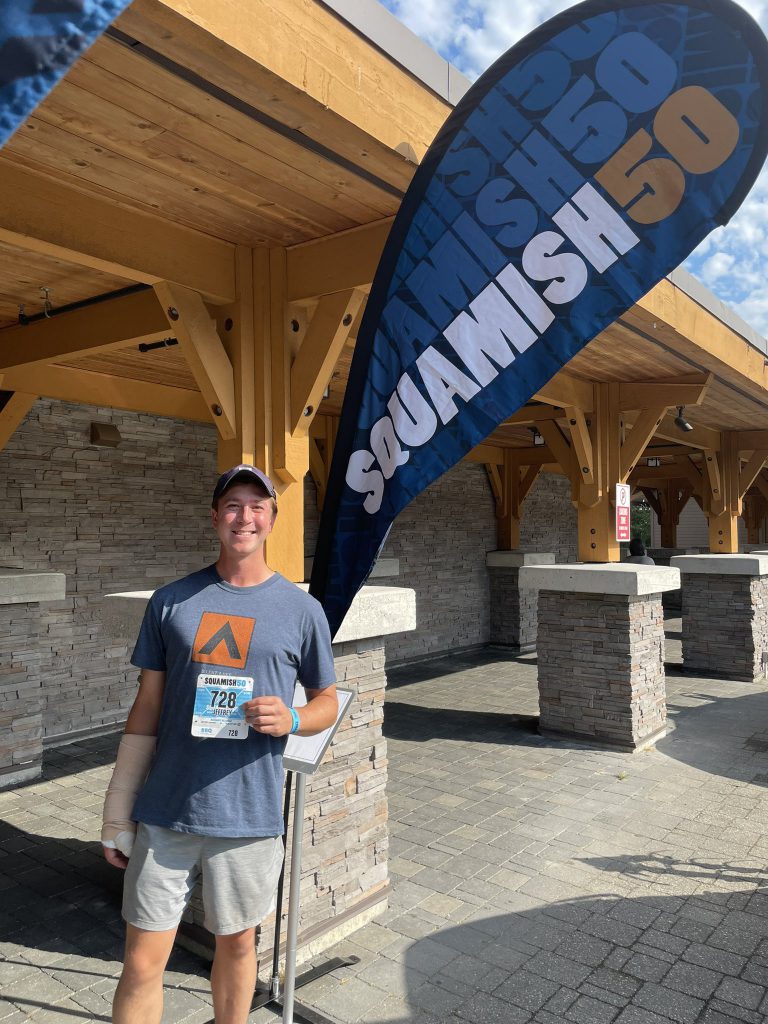
There’s almost been this push because of streaming services to condense as much as possible. But at the same time, there are artists like Spencer Brown and John 00 Fleming who have released lengthy tracks. It’s like they’re bucking the trend of everything else that’s on Spotify. So it’s very nice to hear thoughtful electronic music sometimes.
Oh, yeah, I listen to a lot of that, or I’m listening to stuff that is only just barely flirting with the edges of its geography, a lot of piano stuff. Electronic music can still be piano-based, but there are so many different ways of writing. I always wanted to be like a folk singer. I’ve got the guitars that I always have nearby. I recorded albums, tried to sing, and got my banjos here and everything. But when I was in LA, I worked for a composer and thought that was what I would do. I love long-form storytelling and music with characters and motifs that can return.
So I’m trying to figure out my way of doing it in electronic music. Like last week I was playing a warehouse show. Those are so fun, but people say, “Oh, yeah, that was super fun, but I was hoping to hear ‘Parallel Lines,'” you know, all the really pretty stuff. And I still need to find the perfect way of presenting that side of ATTLAS. That’s the writing I’m really proud of; it’s just super tricky. There’s so much of my music that unless I was like a massive act, who could book a whole cinema or planetarium, it’s tough to find the outlets beyond just listening to it at home.
Yeah, there’s a rise in more mindful music right now. You look at Anjunabeats launching their Reflections label centered only on ambient and downtempo. Curated shows centered on it would be cool.
I think that’s the only place you could ever do something like Storyline, right? I’ve tried it several times, but it just doesn’t fit. And maybe I don’t have to change anything; perhaps I just keep writing, and eventually, I’ll have many tracks to play out in this way that sounds good at home. Then years later, there would be an entire festival set, but also hours and hours if someone says, “I just want to hear his piano stuff.” I always slip one or two piano tracks at the halfway point or catch-your-breath point in the album that fit its context.
But yeah, we’ll see this Sun Lo project goes. It’s sort of different production-wise, maybe not super different. I tried to keep it consistent, mainly because you have his voice singing throughout. It lets my production have a little more freedom. You have to have certain production or stylistic decisions that are relatively consistent within your music if you’re not going to sing just so that you have that fingerprint on your stuff that’s unique to your style. Things are constantly changing, but I often keep things the same.
So we’ve been talking about Sun Lo and what will come. To put a bow on the conversation, what does the near future look like?
Sun Lo is going to roll out, so I’ve got to put a lot of online energy into that. But that’s a lot easier than having to come up with songs. But now I’m writing stuff that’s fun to listen to for me. And it’s probably just going to sound like an evolution of where I was, but it’s going to feel freer for me. I’ve got a million things. I don’t have a keyboard right now; otherwise, I would try to show you. [Laughs]
Definitely, well, on that note, it’s been great chatting with you, have a great rest of your day!
Have a great weekend!
Follow ATTLAS:
Facebook | Twitter | Instagram | SoundCloud



